Antipope Clement VII facts for kids
Quick facts for kids Antipope Clement VII |
|
|---|---|

Interview between the duke of Anjou and pope Clement VII (seated) at Avignon, from Froissart's Chronicles.
|
|
| Diocese | Avignon, France |
| Elected | 20 September 1378 |
| Papacy began | 20 September 1378? |
| Papacy ended | 16 September 1394 |
| Successor | Benedict XIII |
| Opposed to | Roman claimants: |
| Other posts | Count of Geneva |
| Orders | |
| Created Cardinal | 30 May 1371 |
| Rank | Cardinal |
| Personal details | |
| Birth name | Robert of Geneva |
| Born | 1342 Chateau d'Annecy, County of Savoy, Holy Roman Empire |
| Died | Error: Need valid death date (first date): year, month, day Avignon, Papal States |
| Occupation | Archbishop of Cambrai |
| Coat of arms |  |
| Other Popes and Antipopes named Clement | |
Robert of Geneva (born 1342 – died 16 September 1394) was chosen as Clement VII by a group of cardinals. These cardinals were against Pope Urban VI. Clement VII was the first antipope to live in Avignon, France. His election caused a big split in the Christian church, known as the Western Schism.
Robert was the son of Amadeus III, Count of Geneva. He became an Archbishop of Cambrai and then a cardinal in 1371. While working for the Pope in Italy, he was involved in a sad event in the city of Cesena in 1377. The next year, the cardinals who didn't like Urban VI chose Robert as pope. He then moved to Avignon.
Contents
Who Was Robert of Geneva?
Early Life and Church Career
Robert was born in 1342 at the Chateau d'Annecy. His father was Amadeus III of Geneva, a count. Robert studied at La Sorbonne in Paris.
He started his church career early. In 1359, he became a special church official called a prothonotary Apostolic. He later became a bishop and then an archbishop. In 1371, he was made a cardinal.
The Cesena Event
In 1377, Robert was working as a papal legate in Italy. His job was to stop a rebellion in the Papal States. This conflict was called the War of the Eight Saints. Robert led troops to the city of Cesena. The city resisted, and a very sad event happened there. Many civilians died during this time. This event earned him the nickname "butcher of Cesena."
Becoming Count of Geneva
In 1392, Robert's brother, Pierre, passed away. Robert then inherited the title of Count of Geneva. His other brothers had also died without children. After Robert, the title went to his eldest sister Mary's son.
The Western Schism
Becoming an Antipope
On September 20, 1378, cardinals who were against Pope Urban VI chose Robert as pope. This happened in a town called Fondi. Robert became the first antipope of the Western Schism. This was a time when there were two or even three people claiming to be the true pope. This split in the church lasted until 1417.
Clement VII quickly gained support from some powerful people. These included Queen Joanna I of Naples and King Charles V of France. Other countries like Castile, Aragon, and Scotland also supported him. Scotland chose Clement because England supported Urban VI.
Life in Avignon
Clement VII could not stay in Italy. So, he moved to Avignon, a city in southern France. There, he relied on the French royal family for support.
He tried to get help from Louis I, Duke of Anjou, the brother of Charles V. Clement offered Louis a new kingdom to be created from church lands. Louis led a large army into Italy to help Clement. However, Louis died suddenly in 1384, and his efforts were not successful.
Clement continued to seek help from French nobles. He hoped that French armies would help him defeat his rival, Urban VI. He dreamed of returning to Rome as the true pope.
Challenges and End of Reign
Over time, Clement and his supporters realized their plans might not work. They saw that most of Catholic Europe did not support them. Clement also needed a lot of money for his court. This led to some unfair ways of getting funds. These actions caused some of his own supporters to become unhappy.
Clement VII died in Avignon on September 16, 1394.
Later, it was decided that he would be known as an antipope, not a true pope. The confusion during the Western Schism led to a new idea. This idea was called Conciliarism. It suggested that a big church council could be more powerful than the pope. This council could then decide who the real pope should be.
Images for kids
See also
 In Spanish: Clemente VII (antipapa) para niños
In Spanish: Clemente VII (antipapa) para niños
 | Georgia Louise Harris Brown |
 | Julian Abele |
 | Norma Merrick Sklarek |
 | William Sidney Pittman |


